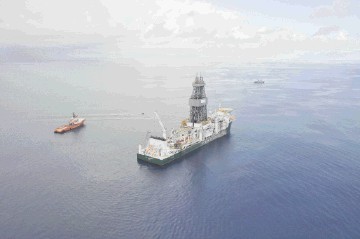
US explorers aren’t the only ones idling rigs as sub-$50 crude forces oil and gas drillers in Africa to slow their search for new reserves.
The number of oil and gas rigs offshore Africa remained at 20 in April, the lowest since 2009, according to data published on Friday by Baker Hughes Inc. Onshore rigs fell to 70 from 71 in March, leaving the total for the continent at 90, near the lowest in four years.
Despite a rebound in crude over the past three months from a 12-year low, prices below $50 a barrel mean only a third of potential projects in Africa have investment appeal, according to Wood MacKenzie. Tullow Oil, the London-based explorer focused on the continent, cut its projection for 2016 capital expenditure by $100 million to $1 billion on April 28.
“The exploration activity has largely dried up — I don’t see that returning anytime soon,” Anish Kapadia, a London-based analyst at Tudor Pickering Holt & Co., said in a phone interview. “The drilling you’ve got is legacy drilling from oil projects going ahead, so at some point that’s going to slow down further unless you’ve got new projects being sanctioned.”
The number of rigs in Angola and Nigeria, Africa’s biggest producers, has dropped to about half of the count when oil began its steep decline two years ago. Only Algeria among the continent’s producers has shown a significant uptick in the activity, with an increase to 55 rigs.
The Baker Hughes data shows the total rig count for Africa declining from the February 2014 high of 154, which followed a spate of discoveries the previous year in countries including Tanzania and Kenya.
The decline in Africa mirrors that in the U.S., where rigs targeting crude fell to 437 in April, less than a quarter of the 2014 peak. America’s oil drillers have been idling rigs for the past 18 months as the world’s largest crude suppliers battle for market share.
That’s now feeding through to lower output, with U.S. production dropping below 9 million barrels for the first time since October 2014, according to EIA data.
“U.S. production was just starting to decline by this time last year but the critical difference is that ex-U.S. supply is now also showing tangible signs of being impacted by low prices,” Citigroup Inc. analysts wrote in a May 4 report. “This dynamic is particularly important, as unlike shale, these supply declines are much harder to reverse in the short or even medium term.”
Eni, one of the most prolific explorers in Africa, could provide a buffer against further declines on the continent. The Rome-based company will concentrate exploration through 2019 in North and West Africa and the Far East, Chief Executive Officer Claudio Descalzi, said in a March 18 strategy presentation.
The oil price is still the ultimate determinant of exploration, according to Chris Bredenhann, a partner at PricewaterhouseCoopers in Cape Town. Brent crude traded close to $45 a barrel on Friday, with the price rallying 60 percent from a Jan. 20 low.
“The consensus seems to be that there will be a slowdown in production, and we have already seen the U.S. coming off its 2015 highs,” he said in an e-mailed response to questions. “The low oil price has put a dampener on the exploration activity in Africa as well, but the recent upward trend in the oil price may potentially change that.”